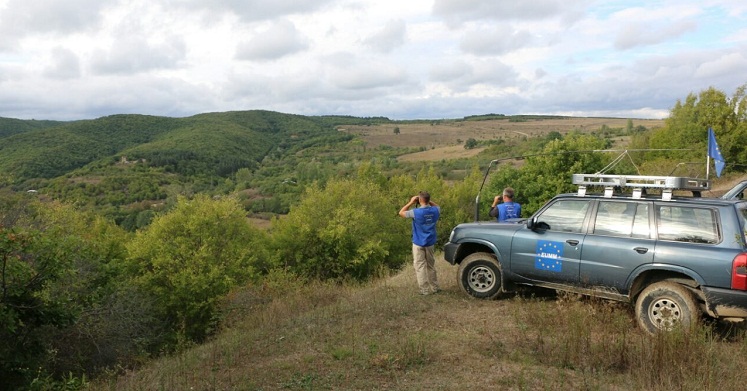EUMM reports details of current tension at Tskhinvali occupation line

The EUMM mission has reported the details of the tension at the Chorchana-Tsnelisi area. Photo: EUMM Georgia.
The European Union Monitoring Mission (EUMM), which is the only mission deployed in Georgia after the Russia-Georgia 2008 war, has provided details regarding the current tension at Georgia’s Russian-occupied Tskhinvali region ‘‘due to the level of press interest and to dispel inaccurate reports.”
The EUMM says that in January 2019 their monitors noted markings on trees in the area between Tsnelisi [Kareli municipality of Georgia under the Russian control] and Chorchana [Khashuri municipality of Georgia, Tbilisi-administered territory].
The EUMM mission head to Georgia Erik Hoeg tweeted.
#EUMM press release about recent developments at the South Ossetian ABLhttps://t.co/fbJHkGWqBw
— Erik Hoeg (@erik_hoeg) September 16, 2019
The Mission assesses these as a feature of ‘borderisation’. However, no actor has claimed responsibility for these markings,” the EUMM reported.
The EUMM says that between 20 and 24 August a new Georgian observation post was established on the outskirts of the village of Tsnelisi by Tbilisi.
The post is located some 240 metres away from the Administrative Boundary Line (ABL) and on Tbilisi-administered territory (TAT) in accordance with the traditionally understood run of the ABL in that area,” the EUMM reports.
The mission writes that responding to the opening of the police post the de facto authorities “established new positions and installed a number of borderisation features, including ‘green signs’ and flags on the Tbilisi-administered territory.”
#EUMM patrols continue in Chorchana/Tsnelisi. After 3 IPRMs positions still far apart, but talks continue. EU has called on actors to show restraint and avoid steps that escalate situation, also urging all to use EUMM-managed hotline and IPRMs to lower tensions through dialogue. pic.twitter.com/E8wgJKVHyP
— Erik Hoeg (@erik_hoeg) September 7, 2019
The features are up 1.3 kilometres beyond the ABL,” the EUMM says.
The statement reads that the EUMM and OSCE have since 29 August facilitated four extraordinary technical meetings within the Incident Prevention and Response Mechanism format to defuse tensions and to identify possible concrete solutions for a more permanent de-escalation. However, ‘positions remaining irreconcilable.’
The mission also notes that two crossing points at Tskhinvali ABL - Odzisi and Sinaguri - have remained closed since September 4 2019.
No concrete indication has been given as to when they will reopen, while statements from security actors of Tskhinvali have linked the closures to the ongoing developments in the Chorchana-Tsnelisi area,” the EUMM says.
The EUMM reports that they see these measures as harmful restrictions of movement, which negatively impact commuters from both sides of the ABL, especially affecting the population living in or regularly commuting to the Akhalgori valley.
 Tweet
Tweet  Share
Share